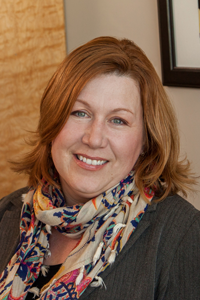Cheryl Currie, PhD '12
Associate Professor and AIHS Translational Health Chair in Aboriginal Health and Well-being
Faculty of Health Sciences, University of Lethbridge Cheryl Currie has been interested in Indigenous health since she was a young girl. Growing up in Winnipeg, Manitoba-which has the largest Indigenous population in Canada-she remembers going for drives with her parents in some of the more difficult areas and wondering why she was seeing what she was seeing.
Cheryl Currie has been interested in Indigenous health since she was a young girl. Growing up in Winnipeg, Manitoba-which has the largest Indigenous population in Canada-she remembers going for drives with her parents in some of the more difficult areas and wondering why she was seeing what she was seeing.
After graduating with her undergraduate and graduate degrees from University of Manitoba, she began working in both urban centres and First Nations communities and was able to explore this question and more. She noted the role that environment had in shaping the health and behaviour of those communities. She wanted to learn more.
"My field was social determinants of health and addiction," explains Currie. "A lot of the research I had seen to date focused more on the individual-the choices they were making or the role that genetics may play. I believed that when it came to things like shaping mental health or addictive behaviour there was much more to it than individual choice."
Based on that belief, she wanted to move from an individual focus to a population health focus. She began looking at doctor of philosophy programs both nationally and internationally. After researching the School of Public Health, she was impressed not only by the programs, but by the list of faculty she would have the opportunity to work with.
"Although I had many mentors in the School, Lory Laing went above and beyond during my experience," explains Currie. "She not only had a strong background in social epidemiology-my focus-but she also mentored me in teaching methods and allowed me to co-teach a course with her. Because of this experience and her support, I was able to leave the School without having done a postdoctoral fellowship and compete for faculty positions."
Currie, a tenure-track associate professor at the University of Lethbridge, is now focused on trying to understand the various determinants-particularly health inequities-that are shaping the health of Indigenous peoples in Canada. Her research shifts the power to the communities, working with the rural and urban Indigenous communities to see how they can move forward to address health inequities.
"I think the answer to many of these issues are in the communities; they aren't in the heads of researchers," says Currie. "I see myself as an instrument that can be used by these communities to answer their questions. How can I be of service?"
(Last updated July, 2016)